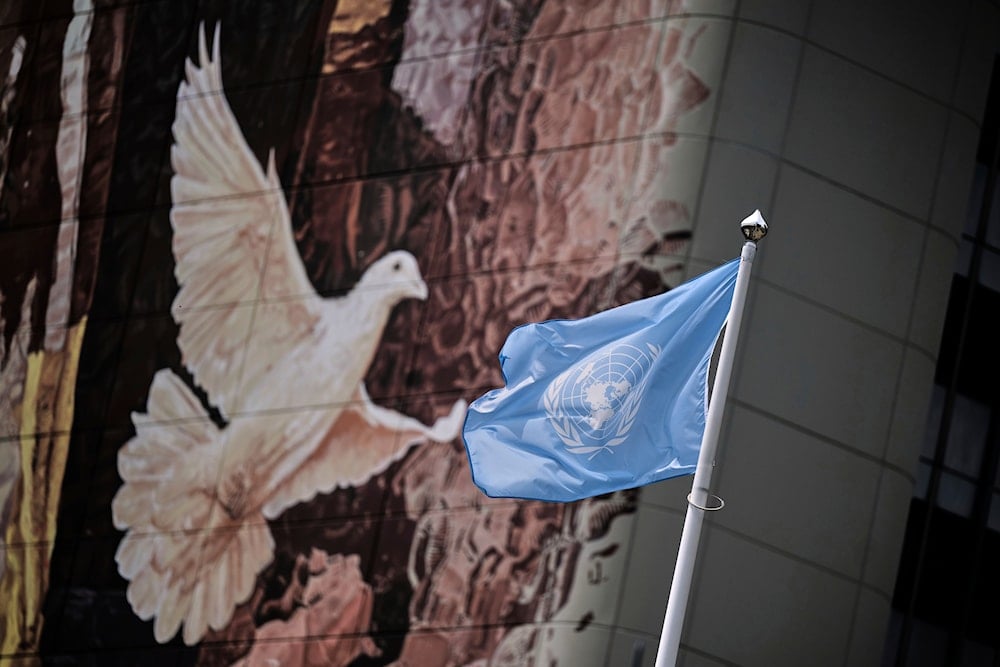Iran reaffirms commitment to nuclear non-proliferation treaty
Iran underscores its adherence to the Nuclear Non-Proliferation Treaty while criticizing Germany's reaction to Tehran's suspension of cooperation with the UN nuclear watchdog, calling Berlin's stance malicious.
-

The flag of the International Atomic Energy Agency (IAEA) waves near a mural in Vienna, Austria, Monday, June 23, 2025 (AP)
Iran reiterated its commitment to the Nuclear Non-Proliferation Treaty (NPT) on Thursday while condemning Germany's criticism of Tehran's move to suspend cooperation with the UN nuclear watchdog, accusing Berlin of acting with "malice."
Foreign Minister Abbas Araghchi stated in a post on X that "Iran remains committed to the NPT (Non-Proliferation Treaty) and its Safeguards Agreement."
Araghchi emphasized that "The explicit German support for the bombing of Iran has obliterated the notion that the German regime harbors anything but malice towards Iranians," as he addressed Berlin's condemnation of Tehran's decision to suspend cooperation with the UN nuclear watchdog.
On July 2, Iran’s Foreign Minister Abbas Araghchi strongly condemned recent remarks by European Commission Vice President and JCPOA Joint Commission Coordinator Kaja Kallas, alleging that she has ignored fundamental international agreements.
Araghchi stated in a post on Twitter that if the JCPOA coordinator aims to end Iran's nuclear program, it would violate the NPT's recognition of peaceful nuclear rights, invalidate UNSCR 2231 and the JCPOA (including snapback), and make EU/UK participation in future talks pointless.
Iran officially halts IAEA cooperation
According to a Wednesday report by Tasnim news agency, Iranian President Masoud Pezeshkian has signed a decree halting the nation's cooperation with the International Atomic Energy Agency (IAEA).
This move follows recent actions by Iran's parliament and occurs as tensions escalate over the country's nuclear activities.
Last week, Iranian Parliament Speaker Mohammad Bagher Ghalibaf stated that legislators had passed a law requiring the halt of cooperation with the IAEA, an organization he accused of acting as "Israel’s protector and servant."
Ghalibaf maintained that cooperation with the IAEA could not continue while concerns about the security of Iran's nuclear facilities persisted, asserting that the agency's objectivity had been undermined due to its alleged connections with "Israel."
Grossi barred from Iranian nuclear facilities
On Sunday, Deputy Speaker of the Iranian Parliament Hamid Reza Haji Babaei declared that IAEA Director-General Rafael Grossi would no longer be permitted to enter Iranian nuclear sites or install monitoring equipment, following Iran's decision to completely halt its collaboration with the international nuclear monitoring body.
"We will no longer give Grossi permission to be present at [Iran's] nuclear facilities and install cameras [there] because we saw information about our facilities in documents received from ... the Israeli regime," Haji Babaei told ISNA news agency.
According to well-informed sources who spoke to Al Mayadeen last month, the Islamic Republic uncovered extensive collaboration between the IAEA and the Israeli occupation, leading Iran to secure through a significant intelligence operation a large cache of highly classified strategic documents and information linked to "Israel."

 3 Min Read
3 Min Read










